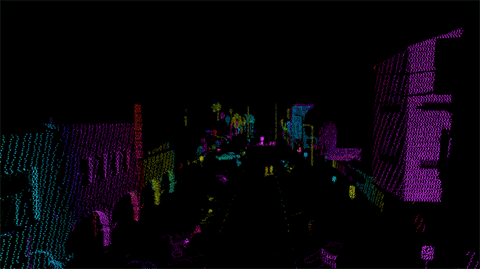Luminar and Volvo Cars Offer a First Look Into Path to Autonomy
Today at AutoMobility Los Angeles, Luminar and Volvo Cars revealed advancements in perception capabilities that are accelerating the development of its R&D efforts. Together the companies are working towards a shared vision of safe, driver-out-of-the-loop autonomy.
This press release features multimedia. View the full release here: https://www.businesswire.com/news/home/20181127005236/en/

Video of data from Luminar's LiDAR sensor platform in Venice, CA. (Graphic: Business Wire)
Volvo is the first of Luminar’s partners to fully develop this capability, and the Luminar team has worked closely with Volvo Cars R&D to create advanced perception technologies. In June, the companies announced its partnership along with an investment in Luminar from the recently formed Volvo Cars Tech Fund. Since then, Volvo Cars has introduced its vision for full autonomy with its 360c concept. The demonstration in Los Angeles gave a look into long-range perception capabilities on a live drive along Los Angeles highways and streets to show Volvo Cars long-range vision at highway speeds leveraging Luminar’s sensing platform.
“The Volvo Cars R&D team is moving at an impressive pace to solve some of the most advanced problems in the development of autonomous driving,” said Luminar founder and chief executive officer, Austin Russell. “As we’ve scaled up, they’ve remained on the forefront of developing an autonomous system to take the driver out of the loop - ultimately enabling deployment in real consumer vehicles.”
Long-range perception is key to achieving Volvo Cars’ vision for 360c. Luminar’s high performance sensing platform finally delivers the range, resolution, and fidelity necessary to achieve safer-than-human understanding of core driving tasks and edge case scenarios. The fidelity enabled the Volvo Cars R&D team to achieve and demonstrate the first ever LiDAR-based pose estimation for autonomous driving. Pose estimation is used to understand and predict pedestrian body language, behavior and intention, but has traditionally only been achieved with dense 2D data from cameras. With LiDAR that achieves camera-like resolution in 3D, this is one of many perception & prediction challenges that can now be reliably solved at distances near and far.
“Autonomous technology will take driving safely to a new level, beyond human limitations. This promise to improve safety is why Volvo Cars wants to be a leader in autonomous drive. Ultimately, the technology will also create new benefits for our customers and society as a whole,” said Henrik Green, senior vice president for research and development at Volvo Cars. “Luminar shares our ambition in making those benefits a reality and this new perception technology is an important next step in that process.”
About Luminar
In April 2017, Luminar came out of stealth after five years in development to debut a new sensing technology that is poised to become the core platform to enable safe, fully autonomous vehicles. The company is funded by Canvas Ventures, GVA Capital and 1517 Fund, and has built a team of over 400 people across three offices, including a 125,000-square-foot manufacturing campus in Orlando. Luminar has partnered with sixteen of the top AV programs, including Volvo Cars and Toyota Research Institute. For more information: https://www.luminartech.com/.
About Volvo Car Group
Volvo has been in operation since 1927. Today, Volvo Cars is one of the most well-known and respected car brands in the world with sales of 571,577 cars in 2017 in about 100 countries. Volvo Cars has been under the ownership of the Zhejiang Geely Holding (Geely Holding) of China since 2010. It formed part of the Swedish Volvo Group until 1999, when the company was bought by Ford Motor Company of the US. In 2010, Volvo Cars was acquired by Geely Holding.
In 2017, Volvo Cars employed on average approximately 38,000 (30,400) full-time employees. Volvo Cars head office, product development, marketing and administration functions are mainly located in Gothenburg, Sweden. Volvo Cars head office for China is located in Shanghai. The company’s main car production plants are located in Gothenburg (Sweden), Ghent (Belgium), Chengdu and Daqing (China), while engines are manufactured in Skövde (Sweden) and Zhangjiakou (China) and body components in Olofström (Sweden).
View source version on businesswire.com: https://www.businesswire.com/news/home/20181127005236/en/



